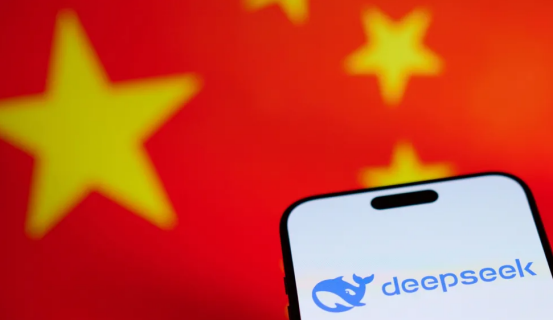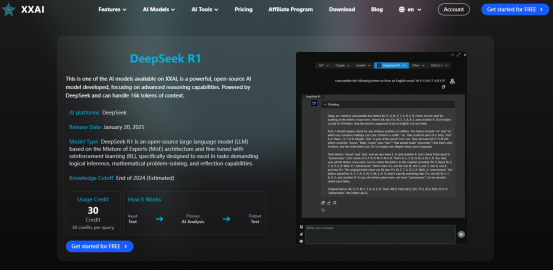DeepSeek User Guide and Why It is Disrupting the AI Industry

DeepSeek User Guide and Why It is Disrupting the AI Industry
On January 27, 2025, a massive shock hit the AI industry. Chinese AI startup DeepSeek topped the app download charts and caused a decline in U.S. tech stocks, making global headlines. However, as DeepSeek seemed to have "come out of nowhere," many people are trying to learn what this tool is, what it can do, and what it means for the AI field.
What is DeepSeek?
DeepSeek is a Chinese startup specializing in artificial intelligence. In December 2024, DeepSeek released the DeepSeek-V3 model, followed by the launch of its AI model DeepSeek-R1 on January 20, 2025. Reportedly, it performs on par with OpenAI’s o1 model, which was released late last year, particularly in tasks like mathematics and coding. Like o1, R1 is a "reasoning" model capable of generating responses step-by-step, mimicking how humans reason through problems or ideas.
Initially, DeepSeek attracted attention from AI enthusiasts before gaining broader recognition and entering the mainstream on January 27. Essentially, it is a chatbot capable of rivaling ChatGPT, developed in China, and released for free.
A Brief Overview of DeepSeek Costs
DeepSeek claims that the production cost of its model is significantly lower. According to its researchers, training costs amounted to $5.58 million, a fraction of the "over $100 million" figure OpenAI’s CEO Sam Altman mentioned for GPT-4. Furthermore, the operational costs of DeepSeek-R1 are much lower than those of OpenAI’s o1 model, reportedly "20 to 50 times cheaper."
DeepSeek's founder reportedly built a store of Nvidia A100 chips, which were restricted from export to China starting in September 2022. Experts believe he paired these with cheaper, less sophisticated chips, achieving a more efficient process overall. DeepSeek also requires less memory than its competitors, ultimately reducing costs for users to perform tasks.
This combination of high performance and low cost helped DeepSeek’s AI assistant become the most downloaded free app on Apple’s App Store in the U.S. upon its release.
Why is DeepSeek Disrupting the AI Industry?
It seems likely that a high-quality Chinese AI chatbot could significantly disrupt the AI industry, which has long been dominated by innovations from OpenAI, Meta, Anthropic, and Perplexity AI.
According to Time Magazine, since Baidu's launch, China has made its first notable attempt to compete in the AI race after many believed it had fallen behind. Furthermore, U.S. restrictions on China's access to advanced AI chip technology were thought to hinder its ability to create AI platforms comparable to those of companies like OpenAI.
Beyond the issues surrounding AI chips, development cost is another key factor driving disruption. DeepSeek claims to have invested $5.58 million to develop the tool. If accurate, this amount is only a tiny fraction of what companies like OpenAI typically spend on model development.
In comparison, OpenAI, with an estimated valuation of $157 billion, is facing scrutiny over whether it can maintain its innovation leadership or justify its massive valuation and spending without significant returns.
DeepSeek’s rise has significantly impacted U.S. stock markets. On January 27, reports of DeepSeek’s dramatically lower costs shook financial markets, causing the Nasdaq index, heavy with tech stocks, to fall by over 3%. Global chip manufacturers and data center providers also faced sell-offs. According to Forbes, Nvidia lost $589 billion in market value after reaching an all-time high, while other major stocks like Broadcom (another AI chip company) suffered substantial losses. The broader stock market was also affected, with the S&P 500 Index (a composite of the top 500 U.S. companies) dropping by 1.5%.
DeepSeek has proven to be highly disruptive, challenging the belief that larger budgets and top-tier chips are the only path to advancing AI. This raises uncertainties about the future demand for high-performance chips.
Counterpoint Research Chief AI Analyst Sun Wei stated:"DeepSeek has shown that cutting-edge AI models can be developed using limited computational resources."
Who is Behind DeepSeek?
Given the impact DeepSeek has had on the AI industry, one might assume it is a competitor to well-established AI companies. However, this is not the case.
DeepSeek was founded by Liang Wenfeng in December 2023, with the first large-scale AI language model released the following year. Mr. Liang graduated from Zhejiang University with degrees in electronic information engineering and computer science. He recently attended a meeting hosted by Chinese Premier Li Qiang, reflecting DeepSeek’s rising prominence in the AI industry.
Unlike many Silicon Valley AI entrepreneurs, Mr. Liang also has a background in finance—he is the CEO of High-Flyer, a hedge fund that utilizes AI to analyze financial data for investment decisions, a practice known as quantitative trading. In 2019, High-Flyer became the first Chinese quant hedge fund to raise over 100 billion RMB ($1.3 billion). In a speech that year, he stated:
"If the U.S. can develop a quantitative trading industry, why can’t China?"
In a rare interview last year, he commented that China’s AI field “can’t always be a follower of U.S. AI development.” When asked about why DeepSeek’s model surprised so many in Silicon Valley, he said:
"They are surprised because they see a Chinese company entering their game as an innovator, rather than as a follower—a role most Chinese companies have grown accustomed to."
DeepSeek has drawn international attention. Australia has banned its use on government devices and systems, citing national security concerns. Numerous global data protection agencies have requested clarity on how DeepSeek handles personal information, as this data is stored on servers located in China. On January 30, Italy blocked DeepSeek's app and ordered the company to cease processing the personal data of its citizens due to data protection concerns.
Overview of the DeepSeek Tool
- AI-powered natural language processing and advanced reasoning (DeepThink mode)
- Multiple access points: iOS, Android, and web-based interface
- Upload options: Support for uploading images, documents, or using real-time camera inputs
- Free to use: with robust search and response capabilities
Key Features
1.Efficiency and Accessibility
- The free version delivers comparable power to subscription-based tools like ChatGPT's o1 version.
2.Intuitive Interface and Flexibility
- Offers multiple modes (Q&A, DeepThink) to address both everyday and technical queries.
3.Economical Innovation
- Achieves advanced reasoning with fewer computational resources, representing a significant engineering feat.
4.Open-Source Advantages
- The only MIT-licensed model listed on the LMSYS Arena leaderboard, demonstrating its commitment to open-source principles and community-driven development.
5.Competitive Performance
- Despite training costs being only 1/20 of OpenAI's o1, DeepSeek-R1 excels in creative writing and offers personalized, unfiltered outputs.
DeepSeek Target Audience and Use Cases
- General Users: For addressing everyday needs
- Researchers and Students: To retrieve detailed background information
- Developers: For coding, solving math problems, and technical tasks
- Content Creators: For exploring creative writing and role-playing scenarios
- Professionals: For quickly gathering data insights without costly subscription fees
How DeepSeek Enhances Your Work
- Provides contextually relevant search results through step-by-step reasoning
- Saves time with faster query processing and advanced filtering
- Supports a wide range of use cases, from technical troubleshooting to brainstorming creative ideas
How to Use DeepSeek?
1. Access DeepSeek
- Mobile Apps: Download from the Apple App Storeor Google Play Store.
- Web Interface: Access DeepSeek via its website or dedicated chatbot at chat.deepseek.com.
Tip: Creating an account might be tricky. You may need to be persistent and try multiple times, using an email/phone number or registering via Apple/Google accounts for smoother access.
You can also use XXAI, which integrates 15 popular AI models, including DeepSeek.

2. Getting Started
- After logging in, type your queries in plain language.
- Combine specific keywords with natural language for better results.
- Use advanced filters (e.g., date, relevance, source) to refine your search and minimize irrelevant outputs.
3. Advanced User Tips
- DeepSeek might censor politically sensitive topics. Subtle adjustments (like swapping similar characters) can sometimes yield more complete responses. However, exercise caution when attempting this.
- R1 is praised for its performance in coding tasks (effortless script conversion) and solving complex mathematical problems.
- Keep prompts concise and well-structured to make the most of its reasoning mode.
Frequently Asked Questions
What is DeepSeek?
DeepSeek is a free AI-powered search engine and chatbot that uses advanced reasoning to deliver contextually relevant results.
How does DeepSeek improve search results?
By leveraging natural language processing and its reasoning mode (DeepThink), it breaks down complex queries into actionable, detailed responses.
Conclusion
Given DeepSeek’s sudden emergence, its long-term impact on the AI industry is hard to predict. However, it already faces obstacles. Reports indicate that on January 27, DeepSeek saw its registration process limited due to what was described as a "massive malicious attack."
If you’d like to experience DeepSeek right away, try out XXAI. In the era of AI, digital transparency and authenticity are becoming increasingly critical.